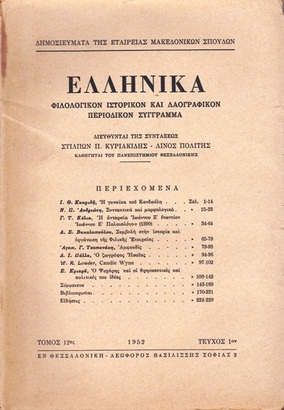Ό λογοτεχνικός θάνατος των εχθρών στην «αυτοβιογραφία » τοϋ Νικηφόρου Βλεμμύδη
Part of : Ελληνικά : φιλολογικό, ιστορικό και λαογραφικό περιοδικό σύγγραμμα ; Vol.48, No.1, 1998, pages 29-46
Issue:
Pages:
29-46
Parallel Title:
The literary death of enemies in the «Autobiography» of Nikephoros Blemmydes
Author:
Abstract:
The present study examines the narrative and structural function of death scenes in the autobiographical work A Partial Accound of My Personal History by Nikephoros Blemmydes (1198-1269). The literary analysis demonstrates that the sixteen death scenes, nine of which concern personal enemies or adversaries of the author, are not simply testimonies to the author's belief in God, but mark him as an elect of God, who suffers for his faith through persecution and temptation. The specific motif of the enemies' death goes back to the Biblical topos of the «death of God's persecutor» (e.g., King Antiochos in 2 Maccabees), which had been exploited in early Church history and hagiography to link, in a symbolic manner and through a metaphorical discourse, a person's life to his manner of death. Blemmydes, by presenting the horrifying deaths of his enemies as just punishments by God, elevates his autobiography into an «autohagiography». In this respect the Partial Account is an innovative and highly individual product of late Byzantine literature.
Subject:
Subject (LC):




